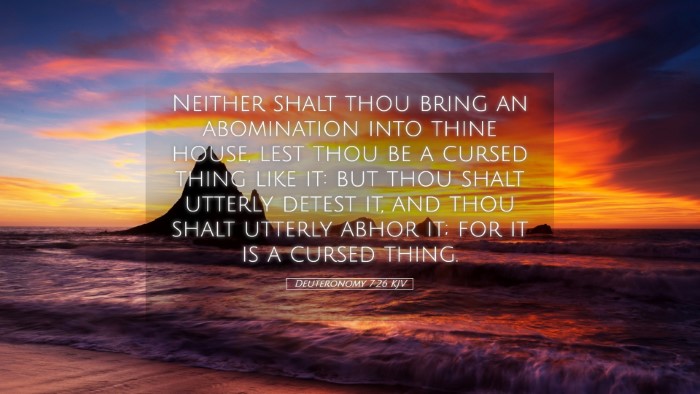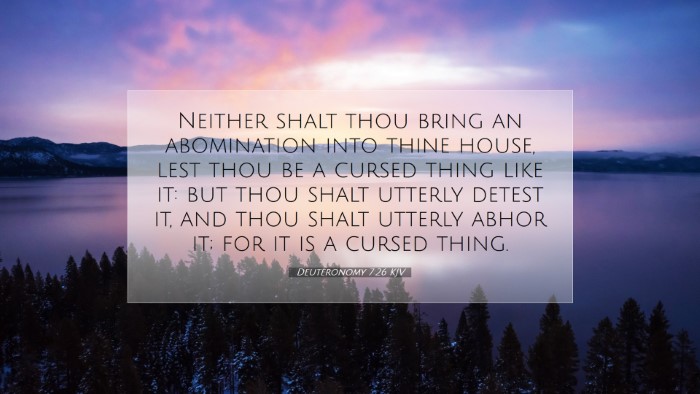Commentary on Deuteronomy 7:26
Deuteronomy 7:26 states: "Neither shalt thou bring an abomination into thine house, lest thou be a cursed thing like it: but thou shalt utterly detest it, and thou shalt utterly abhor it; for it is a cursed thing." This verse serves as a solemn admonition regarding the dangers of idolatry and the corrupting influence of false worship. It emphasizes the necessity of maintaining spiritual integrity and the importance of rejecting all that is abhorrent to God.
General Overview
Throughout the Old Testament, God often warns His people against adopting the practices of neighboring nations, particularly those that involve idol worship. This verse encapsulates that warning, highlighting the serious consequences of allowing sinful practices into one’s life and home.
Insights from Public Domain Commentaries
Matthew Henry
Matthew Henry emphasizes the gravity with which God views the presence of idolatry among His people. He notes that the term "abomination" is significant, describing objects or practices that are detestable to God (Henry). The command to abstain from bringing such abominations into one’s house is indicative of a greater principle: the household should be a sanctuary for God's presence and holiness.
-
Spiritual Contamination: Henry warns that exposure to idolatrous practices can lead to spiritual contamination. He notes, "What we bring into our homes can affect our hearts and our relationships with God."
-
Call to Purity: The directive to "utterly detest" and "abhor" serves as a call to purity, urging believers to be vigilant in guarding against the subtle encroachments of sin.
Albert Barnes
Albert Barnes adds depth to the understanding of this verse by pointing out the historical context of Israel's relationship with surrounding nations. He asserts that the Israelites were frequently tempted to adopt foreign practices and religious customs as they settled into the Promised Land. He highlights several key themes:
-
Covenantal Faithfulness: Barnes stresses that remaining faithful to God and His commandments is vital for the Israelites' covenant relationship with Him. Any compromise could jeopardize this divine favor.
-
Rejecting Idolatry: Idolatry, which is represented through the term "cursed thing," indicates how certain practices can invoke God’s wrath and bring disaster upon the people (Barnes).
Adam Clarke
Adam Clarke provides a practical lens through which to view this passage. He interprets the warning as a directive for Christians today to flee from all that is impure or corrupting. Clarke identifies two main points:
-
Personal Responsibility: Each individual has a responsibility to assess what they allow into their private and public lives. "The home should reflect a commitment to upholding godly principles," Clarke states.
-
Holiness as a Lifestyle: Clarke emphasizes the importance of holiness, arguing that a lifestyle characterized by purity must be devoid of influences that compromise righteousness.
Theological Implications
The theological implications of Deuteronomy 7:26 are significant. It reinforces the principle that the people of God are called to be distinct, set apart from the world, and devoted to God's commandments. The overarching theme reflects God's desire for internal and external purity.
Practical Applications
In light of the teachings from respected commentators, several practical applications can be drawn from this verse:
-
Evaluate Influences: Believers should assess the influences present in their lives and homes, determining whether they align with faith and righteousness.
-
Commit to Holiness: A steadfast commitment to holiness is essential. This includes avoiding secular practices that contradict biblical teaching.
-
Encourage Accountability: Encourage one another in the faith to uphold practices that reflect God’s character and commands.
Conclusion
Deuteronomy 7:26 provides a powerful reminder of the need for vigilance against idolatry and corruption. The insights offered by Matthew Henry, Albert Barnes, and Adam Clarke underscore the necessity of maintaining a life and home that honors God. As individuals and communities of faith, embracing this mandate can lead to spiritual prosperity and unwavering loyalty to God.


